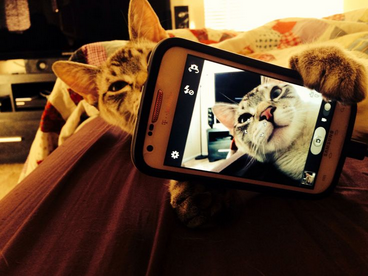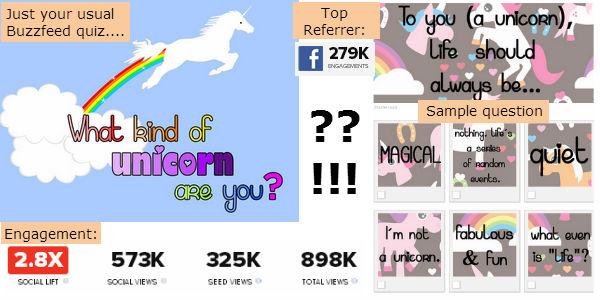The Oxford Dictionary defines narcissism as:
Excessive interest in or admiration of oneself and one’s physical appearance.
I’m not saying that everyone’s a narcissist. But it most certainly is a characteristic shared by everyone on the planet. Humans are naturally quite self-absorbed. It’s in our nature. Well, we have to be otherwise we would lack the will and determination to instinctively thrive and survive as a species. There is nothing wrong with a little self-appreciation. Fortunately or unfortunately, we in this current generation of modern technology and internet are able to exploit this characteristic, allowing us to build platforms on which we can stand upon and project our personalities for the whole world to see. It doesn’t make us a bad person. It makes us human.
We have learnt the ways in which we can successfully tailor the user experience by leveraging people’s natural infatuations with themselves. Websites and online interactions that feed the user what they want whilst simultaneously stroking the user’s ego. But in such a way that it can be difficult to distinguish who really benefits the most in this twisted, dystopian arrangement.
You can see the friendly manipulation at play on some website’s on-page copy. Smart usage of personal pronouns that immediately grips the user into believing that it is all about them and how important they are. CTAs which spark intrigue and excitement in the user, while smoothing over any doubts in their mind as to whether they really do want to upgrade to the Awesome version or not. “Hellayeah, I’m awesome! Gimme!” might be the last words you say before committing to an extra $100 a month on a service that you’re not going to utilise.
Google’s personalised search makes using their search engine even more irresistible to its self-absorbed users, ranking content that we have historically preferred higher than it would otherwise. Using our browser cookie record, Google will by default display personalised search results, listing the webpages Google assume you would like based on your browsing history, among the results that are there due to search relevance. Google knows what you want and will feed you what you want. Biasing information discovery in this way only serves to confirm our own sense of online identity.
Image is Everything
There’s an interesting element of role reversal between users and brands these days. Companies are personalising their image, toning down their brand’s own narcissism, whilst brand-ifying their fans and followers. We brand ourselves. We’ve become extremely good at it. Teenage girls who frequently use social media have become branding experts. We customise our own packaging, and choose the words and images that we want to represent us as an individual. Clutching at our own personal USP, and flaunting it on every online profile we can get our hands on. And the more information people share about themselves online, the easier they become to target. It is then the job of the marketer to find ways in which to convince the user that we can help to enhance the user’s public image.
We can help those users to satiate that urgency for attention and drama in their mission to make their mark in society. It’s an exhibitionist online society that we inhabit, and there are so many tools and resources easily accessible for large scale self-expression and self-promotion. People crave the assurance of knowing that their existence is somewhat significant.
The Common #SELFIE
- In 2013, “selfie” was awarded Oxford Dictionary’s Word of the Year.
- According to Samsung, selfies make up almost a third of all photos taken by young people between the ages of 18-24.
- At the time of writing this article, there are 120,659,760 posts uploaded onto Instagram containing the hashtag #selfie. Not including the millions upon millions of photos uploaded containing selfie-related tags such as: #selfies; #selfiesunday; #selfienation; #selfietime; #selfiesaturday. There are more trust me. But those five additional selfie-related tags alone make up 22,954,075 Instagram posts. And by tomorrow, there’ll be more…
It seems that people will find any reason to upload a picture of themselves. Big brands have successfully capitalised on the opportunity with marketing campaigns bribing users with the promise of a chance to win a prize if they take a selfie with or whilst using their product, remembering to tag the brand’s username in the photo. They’re going to take that selfie anyway, why not make them take it with your product in shot? It almost gives the user permission to upload yet another selfie; this one has cause!
Selfies are powerful. The most ReTweeted Tweet of all time was the famed Oscars selfie that immediately went viral. Even NASA, for Earth Day 2014, requested selfies from all over the world. NASA then took a selfie of the planet Earth from space, then used the thousands of selfies that were sent in to create a 32 gigapixel zoomable mosaic of Earth’s selfie, each individual selfie occupying a single pixel. #GlobalSelfie.
The act of producing a self-portrait is no recent phenomenon. Even before the MySpace Pics revolution, people have always found great pleasure in seeing their own faces. Selfies have only become as huge as they are now due to the ease of which we can snap a quick one whenever we feel like it. We possess the tools for it to be a mindless act, holding our phone in front of us and distributing it to thousands of people through a single tap.

The Share-worthy Quiz
Everybody loves a good quiz. What better way to tell everyone how interesting you are! Quizzes are great because, like a fortune cookie or magazine horoscope, you can write every result to be deliciously appealing to the user. The quiz itself doesn’t necessarily have to be good; it’s all about how you present the results. Ultimately, the result is what the user is looking for. As long as the questions reach some generic logical conclusion, nobody really cares how they got to it. If you write them a good one, they’re going to promote the hell out of that quiz. Because nobody wants to promote something that’s going to make them look bad.
We might even lie on quizzes, just so we get a result that’s going to depict us in a more flattering light when we finally share it with our Facebook friends.
Quizzes are the perfect social tool for people to declare to the world: “This is who I am!”, without the added boastfulness of declaring it themselves. We look to quizzes for synthetic comfort; we want them to affirm our identity. Social media feeds off of human insecurity, we look to others via the medium to tell us that we’re doing okay. “This quiz says I have a beautifully shy and cute personality. I don’t think I am, but if the quiz believes it to be true…”
“This quiz says that I am a unique speck of dust, swaying in the breeze of mediocrity.”
In the lifelong endeavour to discover who we truly are, do quizzes actually contribute any mileage toward this proverbial journey of self-discovery? No. Not really. But they make the user feel pretty darn peachy with themselves, spreading the social love rather generously.

Gamifying Nothing
We love websites and programs that turn every little thing into a competition, so we can grade ourselves in comparison to our peers and pride ourselves in being the best at something in a public forum. We strive for recognition. Gamification can be used to drive user loyalty, retention and engagement. Websites like Klout can measure our social media popularity, a figure in which we can pride ourselves on our growing social influence, but don’t really offer much more. Steam successfully coaxes its users into an addictive game to win more Achievement badges to adorn the users’ social gaming profiles… through what? Even more gaming, through their client. They’ve managed to gamify the gaming experience. Gamers can spend even more hours playing a game, trying to win a badge to prove that they played that game twenty times over, on all difficulties, without taking any damage, and with a goat strapped to their face.
Baiting Engagement
Numerous studies have shown that people don’t always read the material that they share on social media. In fact, an enticing combination of the title and featured image can be enough to shape public perception of yourself. I’ve ReTweeted links to pages I’ve never even visited, just because they looked good on my feed. Likewise, I’ve seen in my analytics Tweets that have been RT’d a dozen times with a reach in the tens of thousands, but not a single click through on the link. The number of [Followers|ReTweets|Favourites|Shares|Likes] is a mere vanity figure – meaningless unless you’re getting the engagement to match. Sure you’re putting yourself out there in front of new audiences, but are you actually being seen by anyone? And does anyone even care?
Comments on a blog post are great, and there are loads of benefits to frequently acquiring them, they may even contribute to your “fresh factor“. If you want people to comment on your blog post, fish for them. People like their opinions to be heard; you just need to know how to prompt them. And when that doesn’t work, or for an extra boost in comments, we may take a leisurely stroll around the blogosphere leaving cheery personalised comments in hopes that the blogger returns the favour. The same reason behind the mass amounts of “ur beautiful x” photo comments you see on Facebook. We expect the same in return.
Internet users are constantly looking for something to engage in, something that they can temporarily throw themselves into before abandoning it for the next thing. You need to give them something to participate in so that they can, for a short period of time, one with that flock. That could just be involving themselves in the mob mentality of a trending hashtag. We often see people taking sides in a big brand’s sponsored hashtag or even in current events related hashtags. Two similar hashtags supporting opposing views, and the brand may leave it up for follower debate which they side with. Hashtags these days are worn like badges or buttons of flare. The possibility for amplification is huge if you can generate enough interest surrounding a branded hashtag.
I know it’s not just me…
This morning, I came across a newly published article. I quickly determined its social worth based solely on its catchy title and a quick skim of the content alone before sharing it on Reddit. Then, and only then, did I go back to read the article in full myself. I basically vouched for something I hadn’t even read yet. I wanted to be first. I admit that to you now knowing that it isn’t just me. For the same reason YouTube users used to obnoxiously type “first” in the comments while watching the video, I wanted to be the one to share it first. “Look how savvy I am, I knew about this before anybody else!”. We are all culprits.

